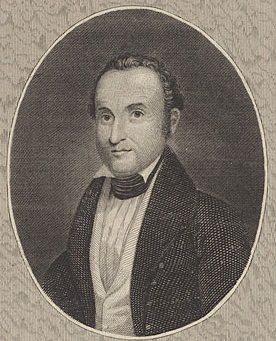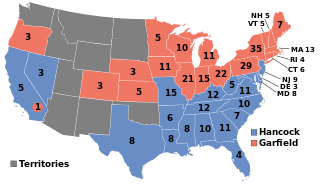A special election was held in Ohio's 10th congressional district on October 10, 1826, the same day as the general elections for the 20th Congress, to fill a vacancy caused by the resignation of David Jennings (A) on May 25, 1826. [1]
| Elections in Ohio |
|---|
 |
A special election was held in Ohio's 10th congressional district on October 10, 1826, the same day as the general elections for the 20th Congress, to fill a vacancy caused by the resignation of David Jennings (A) on May 25, 1826. [1]
| Candidate | Party | Votes [2] | Percent |
|---|---|---|---|
| Thomas Shannon | Anti-Jacksonian | 2,621 | 37.0% |
| John Patterson | Anti-Jacksonian | 2,276 | 32.2% |
| David Robb | Unknown | 1,269 | 17.9% |
| Zaccheus Beatty | Unknown | 913 | 12.9% |
Shannon took his seat on December 4, 1826, [1] and served only for the remainder of the 19th Congress. He did not run in the general election for the 20th Congress.

The 1996 United States House of Representatives elections was an election for the United States House of Representatives on November 5, 1996, to elect members to serve in the 105th United States Congress. They coincided with the re-election of President Bill Clinton. Democrats won the popular vote by almost 60,000 votes (0.07%) and gained a net of two seats from the Republicans, but the Republicans retained an overall majority of seats in the House for the first time since 1928.

The 1826–27 United States House of Representatives elections were held on various dates in various states between July 3, 1826, and August 30, 1827. Each state set its own date for its elections to the House of Representatives before the first session of the 20th United States Congress convened on December 3, 1827. They occurred during John Quincy Adams's presidency. Elections were held for all 213 seats, representing 24 states.

New York's 19th congressional district is a congressional district for the United States House of Representatives located in New York’s Catskills, Hudson Valley, greater Capital District, Southern Tier, and Finger Lakes regions. It lies partially in the northernmost region of the New York metropolitan area and mostly south of Albany. This district is represented by Democrat Josh Riley.

John Wilson Campbell was a United States representative from Ohio and a United States district judge of the United States District Court for the District of Ohio.

William W. Irvin also spelled Irwin was a 19th-century lawyer, farmer, politician, and two-term U.S. Representative from Ohio from 1829 to 1833.

The 1830–31 United States Senate elections were held on various dates in various states. As these U.S. Senate elections were prior to the ratification of the Seventeenth Amendment in 1913, senators were chosen by state legislatures. Senators were elected over a wide range of time throughout 1830 and 1831, and a seat may have been filled months late or remained vacant due to legislative deadlock. In these elections, terms were up for the senators in Class 3.

The 1826–27 United States Senate elections were held on various dates in various states. As these U.S. Senate elections were prior to the ratification of the Seventeenth Amendment in 1913, senators were chosen by state legislatures. Senators were elected over a wide range of time throughout 1826 and 1827, and a seat may have been filled months late or remained vacant due to legislative deadlock. In these elections, terms were up for the senators in Class 1.

The 1824 United States House of Representatives elections in New York were held from November 1 to 3, 1824, to elect 34 U.S. Representatives to represent the State of New York in the United States House of Representatives of the 19th United States Congress.

The 1826 United States House of Representatives elections in New York were held from November 6 to 8, 1826, to elect 34 U.S. Representatives to represent the State of New York in the United States House of Representatives of the 20th United States Congress.

On January 12, 1826, Patrick Farrelly (J) of Pennsylvania's 18th district died in office. A special election was held to fill the resulting vacancy

On May 1, 1826, Alexander Thomson (J) of Pennsylvania's 13th district resigned. A special election was held to fill the resulting vacancy on October 10, 1826, the same day as the general elections to the 20th Congress.

At some point in 1826, Joseph Hemphill (J) of Pennsylvania's 2nd district resigned from Congress. A special election was held to fill the resulting vacancy.

On August 14, 1826, Henry Wilson (J) of Pennsylvania's 7th district died. A special election was held to fill the resulting vacancy on October 10, 1826.

In the 1826 elections in Pennsylvania, a tie vote occurred in the 2nd district. As a result, no candidate won in that district and a special election was held on October 9, 1827.

A special election was held in Mississippi's at-large congressional district on July 11, 1826, to fill a vacancy caused by the death of Christopher Rankin (J) on March 14, 1826

A special election was held in North Carolina's 8th congressional district on November 3, 1826, to fill a vacancy caused by the resignation of Willie P. Mangum (J) on March 18, 1826

A special election was held in Georgia's 1st congressional district on October 1, 1827 to fill a vacancy left by the resignation of Edward F. Tattnall (J) prior to the start of the 20th Congress.

The 1880 United States elections occurred during the Third Party System, and elected the members of the 47th United States Congress. Republicans retained the presidency and took control of the House. An unclear partisan situation prevailed in the Senate. As the first presidential election after the end of Reconstruction, this election saw the first occurrence of the Democratic Party sweeping the Southern United States; the party would carry an overwhelming majority of Southern states well into the 20th century.
The 1826 United States elections occurred in the middle of Democratic-Republican President John Quincy Adams's term. Members of the 20th United States Congress were chosen in this election. The election took place during a transitional period between the First Party System and the Second Party System. With the Federalist Party no longer active as a major political party, the major split in Congress was between supporters of Adams and supporters of Andrew Jackson, who Adams had defeated in the 1824 Presidential election.